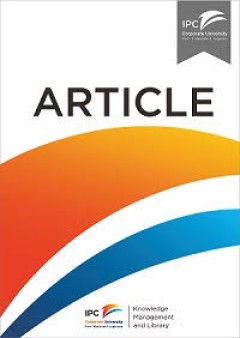Ditapis dengan

Coastal & Deep Ocean Dredging
- Edisi
- -
- ISBN/ISSN
- -
- Deskripsi Fisik
- -
- Judul Seri
- -
- No. Panggil
- SC TXT COA h
- Edisi
- -
- ISBN/ISSN
- -
- Deskripsi Fisik
- -
- Judul Seri
- -
- No. Panggil
- SC TXT COA h

The managerialistic ideology of organisational change management
- Edisi
- Vol. 20 issue: 1, pp.126-144
- ISBN/ISSN
- -
- Deskripsi Fisik
- -
- Judul Seri
- Journal of Organizational Change Management
- No. Panggil
- ATC MG DIE m
- Edisi
- Vol. 20 issue: 1, pp.126-144
- ISBN/ISSN
- -
- Deskripsi Fisik
- -
- Judul Seri
- Journal of Organizational Change Management
- No. Panggil
- ATC MG DIE m

The port as a critical piece of national
- Edisi
- -
- ISBN/ISSN
- 2469-4126
- Deskripsi Fisik
- -
- Judul Seri
- Safety and Reliability
- No. Panggil
- ATC PO ANA p
- Edisi
- -
- ISBN/ISSN
- 2469-4126
- Deskripsi Fisik
- -
- Judul Seri
- Safety and Reliability
- No. Panggil
- ATC PO ANA p

Think : why you should question everything
This fresh and exciting approach to science, skepticism, and critical thinking will enlighten and inspire readers of all ages. With a mix of wit and wisdom, it challenges everyone to think like a scientist, embrace the skeptical life, and improve their critical thinking skills. shows you how to better navigate through the maze of biases and traps that are standard features of every human brain…
- Edisi
- -
- ISBN/ISSN
- 978-1-61614-807-2
- Deskripsi Fisik
- 240 p., 21 cm ; index
- Judul Seri
- -
- No. Panggil
- LC 153.4 HAR t

Getting real about Big Data: applying critical realism to analyse Big Data hype
An emerging application of Big Data is the addition of sensors and other micro-electronic devices to engineer-to-order (ETO) goods such as one-of-a-kind buildings and ships. The addition of micro-electronic devices can enable the setting up and operation of smart buildings and smart ships. The purpose of this paper is to provide a critical realist analysis of Big Data hype. This is necessary…
- Edisi
- Vol. 6 No. 4, 2013 pp. 739-760
- ISBN/ISSN
- 1753-8378
- Deskripsi Fisik
- 24 p.
- Judul Seri
- International Journal of Managing Projects in Business
- No. Panggil
- ATC MR FOX g
The role of knowledge management in corporate
- Edisi
- Knowledge Management Summit 2017 Report
- ISBN/ISSN
- -
- Deskripsi Fisik
- 6 pages
- Judul Seri
- -
- No. Panggil
- PPT PO ELV t
- Edisi
- Knowledge Management Summit 2017 Report
- ISBN/ISSN
- -
- Deskripsi Fisik
- 6 pages
- Judul Seri
- -
- No. Panggil
- PPT PO ELV t

What breaks trust in customer supplier relationship?
The purpose of this paper is to understand what breaks trust in a customer supplier relationship and how to repair it.
- Edisi
- Vol. 48 No. 3, 2010 pp. 353-365
- ISBN/ISSN
- 0025-1747
- Deskripsi Fisik
- 15 p.
- Judul Seri
- Management Decision
- No. Panggil
- ATC MG LAE w

The common welfare human resource management system
The purpose of this paper is to propose a new generic human resource management (HRM) system linked to a novel and more developed social and organizational paradigm: the common welfare HRM system.
- Edisi
- -
- ISBN/ISSN
- -
- Deskripsi Fisik
- 21 p .
- Judul Seri
- -
- No. Panggil
- ATC MG CHI t

An empirical analysis of core competence for high-tech firms and traditional …
The main purposes of this paper are as follows. Exploring whether there is significant difference in the model of core competence between H-T firms and T-Ms in Taiwan. Investigating whether there is significant difference in the explanatory power of dimensions of core competence both for H-T firms and T-Ms in Taiwan.
- Edisi
- Vol. 26 No. 2, 2007 pp. 159-168
- ISBN/ISSN
- -
- Deskripsi Fisik
- 12 p.
- Judul Seri
- Journal of Management Development
- No. Panggil
- ATC LO CHI a

From task-based to competency-based : a typology and process supporting a cri…
Organizational effectiveness today depends largely on the ability to activate, share and transform the intellectual capital of the company into sustainable and difficult-to-imitate competitive advantage. This paper seeks to develop a competency typology that integrates previous definitions and frameworks from the literature and to propose a methodology for identifying competencies to aid the …
- Edisi
- Vol. 39 No. 3, 2010 pp. 325-346
- ISBN/ISSN
- 0048-3486
- Deskripsi Fisik
- 24 p.
- Judul Seri
- Personnel Review
- No. Panggil
- ATC MG SOD f

Cyclone risk mapping for critical coastal infrastructure: cases of East Asian…
Seaport is a critical coastal infrastructure serving important economic purposes but at the same time is exposed to a wide range of natural hazards including tropical cyclones. Mapping of cyclone risk for seaports is a primary step in risk planning and mitigation which remains a gap in the literature. Since East Asia is among the most affected areas of cyclone risk, and also the region where th…
- Edisi
- -
- ISBN/ISSN
- -
- Deskripsi Fisik
- 12 p .
- Judul Seri
- -
- No. Panggil
- ATC PO GOU c

Public-private partnerships for the provision of port infrastructure: an expl…
Public-private cooperation on the level of project finance, and provision of large-scale infrastructure projects, is increasing on the global level. This paper uses a multi-actor analysis, in order to explore the critical success factors (CSFs) for sound implementation of public-private partnerships (PPPs) in the port context, and to determine the diverging opinions of stakeholders with regard …
- Edisi
- vol.30
- ISBN/ISSN
- -
- Deskripsi Fisik
- 26 p.
- Judul Seri
- -
- No. Panggil
- ATC PO AER p

Critical success factors in the context of humanitarian aid supply chains
Critical success factors (CSFs) have been widely used in the context of commercial supply chains. However, in the context of humanitarian aid (HA) this is a poorly addressed area and this paper therefore aims to set out the key areas for research.
- Edisi
- Vol. 39 No. 6, 2009 pp. 450-468
- ISBN/ISSN
- -
- Deskripsi Fisik
- 25 p.
- Judul Seri
- International Journal of Physical Distribution & Logistics Management
- No. Panggil
- ATC LO BER c

The successful management of a small logistics company
In this paper, a case study conducted on a small third-party logistics (3PL) company in Hong Kong is presented. This company is interesting in that it has been designated as the “king” of Hong Kong’s 3PL (in-bound) logistics companies. The company has been successful in its overall business performance and in satisfying customers. This company’s strategic alliances with both clients and…
- Edisi
- Vol. 33 No. 9, 2003 pp. 825-842
- ISBN/ISSN
- -
- Deskripsi Fisik
- 22 p.
- Judul Seri
- International Journal of Physical Distribution & Logistics Management
- No. Panggil
- ATC LO NGA t

The resilience of energy supply chains: a multiple case study approach on oil…
The purpose of this paper is to enhance the understanding about how energy supply chains work to build resilience against exogenous security threats and thereafter what support mechanisms should be introduced or improved by the European Union.
- Edisi
- Volume 19 · Number 1 · 2014 · 46–63
- ISBN/ISSN
- -
- Deskripsi Fisik
- 20 p.
- Judul Seri
- Supply Chain Management: An International Journal
- No. Panggil
- ATC LO URC t

Optimizing inventory and store results in big box retail environment
This paper seeks to examine key factors within the control of store managers to optimizing inventory and store results.
- Edisi
- Vol. 36 No. 3, 2008 pp. 180-191
- ISBN/ISSN
- -
- Deskripsi Fisik
- 14 p.
- Judul Seri
- International Journal of Retail & Distribution Management
- No. Panggil
- ATC LO AYA o

Lessons on knowledge creation in supply chain management
The purpose of this study is to convey lessons learned from a long-term research project and present a coherent approach for researching relevant areas, ranging from ontology to quality.
- Edisi
- Vol. 27 No. 4, 2015 pp. 346-368
- ISBN/ISSN
- -
- Deskripsi Fisik
- 25 p.
- Judul Seri
- European Business Review
- No. Panggil
- ATC LO ERI l

Critical success factors in e-learning ecosystems: a qualitative study
The purpose of this paper is to evaluate the critical success factors for sustainable e-learning in an e-learning ecosystem framework. Three critical components of the e-learning ecosystem including principles and methods, processes and systems, and substance and content are considered based on a comprehensive review of the relevant literature in e-learning.
- Edisi
- Vol. 12 No. 4, 2010 pp. 263-288
- ISBN/ISSN
- -
- Deskripsi Fisik
- 28 p .
- Judul Seri
- Journal of Systems and Information Technology
- No. Panggil
- ATC LO COR c

Critical realism in supply chain research: Understanding the dynamics of a se…
The purpose of this paper is to show how a critical realist paradigmatic stance and its associated research methodology can contribute to supply-chain research by providing explanations for specific supply-chain- and logistics-related dynamic phenomena.
- Edisi
- Vol. 42 No. 10, 2012 pp. 906-930
- ISBN/ISSN
- -
- Deskripsi Fisik
- 27 p.
- Judul Seri
- International Journal of Physical Distribution & Logistics Management
- No. Panggil
- ATC LO POM c

Critical elements that discriminate between successful and unsuccessful ERP i…
The purpose of this paper is to explore enterprise resource planning (ERP) implementation project performance of successful and unsuccessful implementations; critical elements (CEs) that are conducive to success; and whether implementation project performance and CEs vary across the number of modules implemented, product type, and number of employees affected by the ERP.
- Edisi
- Vol. 23 No. 4, 2010 pp. 466-485
- ISBN/ISSN
- -
- Deskripsi Fisik
- 22 p.
- Judul Seri
- Journal of Enterprise Information Management
- No. Panggil
- ATC LO GUN c
 Karya Umum
Karya Umum  Filsafat
Filsafat  Agama
Agama  Ilmu-ilmu Sosial
Ilmu-ilmu Sosial  Bahasa
Bahasa  Ilmu-ilmu Murni
Ilmu-ilmu Murni  Ilmu-ilmu Terapan
Ilmu-ilmu Terapan  Kesenian, Hiburan, dan Olahraga
Kesenian, Hiburan, dan Olahraga  Kesusastraan
Kesusastraan  Geografi dan Sejarah
Geografi dan Sejarah